#sonder magazine
Text
I've loved being involved with the Morning Coffee Writing Competition this summer and today is our final day for submissions (we close at midnight Dublin time). If you have a 500-1000 word story up your sleeve or would simply like to donate, you can do so via this link. All proceeds go to the Dublin Rape Crisis Centre and the winner will receive 200€ + publication in the next issue of Sonder Magazine!
#Morning Coffee Writing Competition#Dublin Rape Crisis Centre#DRCC#Sonder#Sonder magazine#Irish#writing competition#writblr#writing#ireland
0 notes
Text


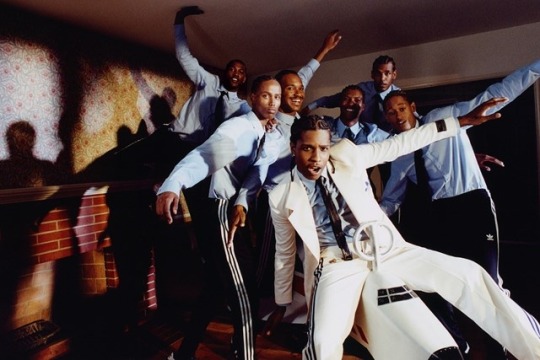

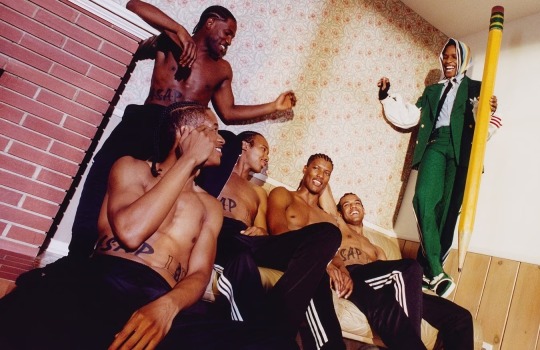

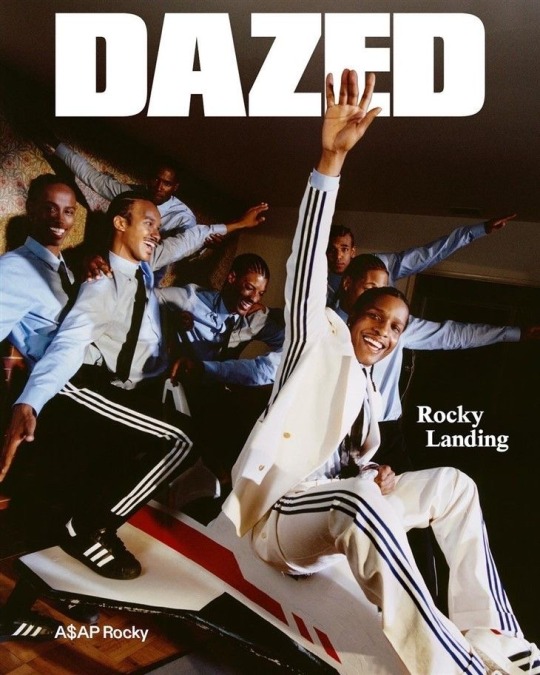
ASAP ROCKY x DAZED | MAY 2022 | FATHER OF A GENERATION
#asap rocky#asap#awge#asap mob#fashion#music#hip hop#aesthetic#rihanna#streetstyle#street wear#sonder#sonderwrld#tyler the creator#playboi carti#dazed#dazed magazine#dazed fashion#Gucci
166 notes
·
View notes
Text
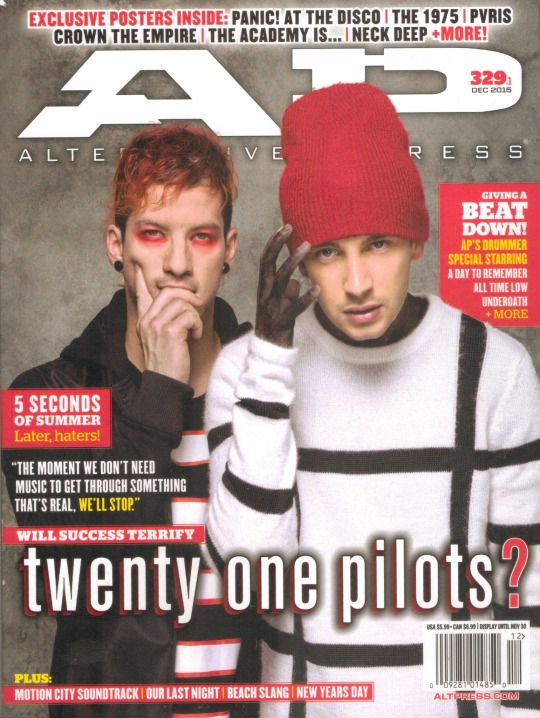





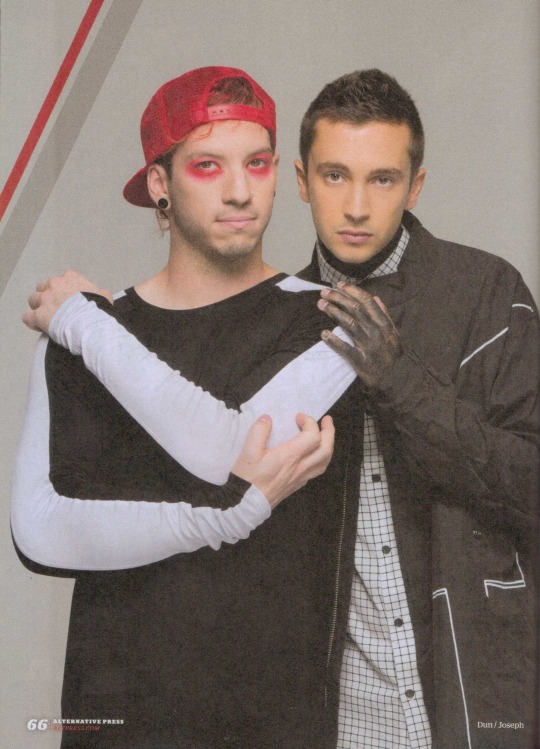

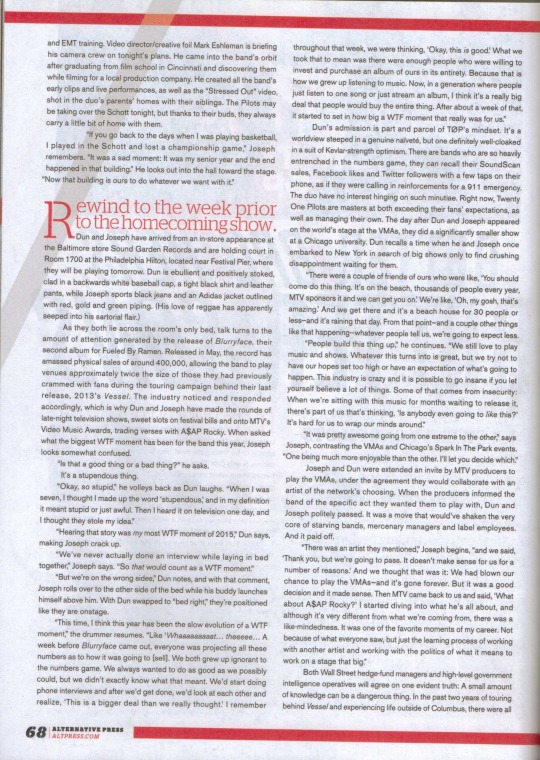

alternative press december 2015 issue 329 1/2
#josh dun#joshua dun#twenty one pilots#twentyonepilots#tyler joseph#alt press#alternative press#alt press mag#alt press magazine#alternative press magazine#december#december 2015#dec '15#2015#jason pettigrew#douglas sonders#zildjian#amanda valentine#valentime#valentimes#brielle breheny#hopefullydoubting#amanda mohlin axeisson#fosteredimposter#sara ajdahim
85 notes
·
View notes
Text
GALLERY: Dermot Kennedy

by Vi McDonald
Last Saturday evening, Dermot Kennedy graced the Red Hat Amphitheater stage in Raleigh, North Carolina, to perform a show on his Sonder tour. The show was, in a word, touching. Dermot’s music has always tugged at the heartstrings, but seeing him live gives a distinct personal element to the songs, and the open, vulnerable way he connects with the audience creates a feeling that stays with you long after the show is over.
Dermot brought mehro on tour as the opening act, a singer-songwriter whose songs explode with emotion. It was the last show for mehro on the Sonder tour, and the audience received his open, friendly demeanor and his vulnerability with enthusiasm. He took the time to connect with the crowd, sharing lessons that he’s learned even as they were infused into the music. “If you’re here with somebody that you love tonight,” he said a few songs before the set finished, “I hope you take a moment to enjoy their presence.” And it seemed like the audience took his advice; even between sets, I noticed people dancing with their loved ones, meeting new people, and treasuring their relationships. It was the perfect way to start the show.



That energy only intensified when Dermot took the stage. Every single word that he sang felt like it came straight from the heart, and the additional notes, riffs, and melodies added to some of the tracks made the set feel special to experience live. The audience knew the words to every song, even older EP tracks that haven’t been present on either of Dermot’s two albums, and of course favorites like “Something to Someone,” and “Rome.” “Rome” was particularly special, as Dermot asked the audience to hold up lights for the song to represent the memory of their most perfect day, to relive it while he sang. At one point during the show, Dermot paused to discuss with the audience a common thread in his music, saying that a lot of his writing is driven by “the fear of time passing.” I was touched by this, and I wasn’t the only one. I watched a pair of friends in the audience tear up and embrace as Dermot explained, “[Time] compels me – it helps me act on my instincts and tell people how I feel about them.” He then said, “If you’ve had love in your life, be so grateful, really try your best to cherish it and be as present as you can because the time we have is so brief. And it’s scary, but it’s the most beautiful thing we have.”
Dermot Kennedy’s Sonder tour isn’t over yet – he’ll be touring through the fall. You can see the list of tour dates here, and be sure to check out our highlights from the show below.











#music#dermot kennedy#heartsleeve magazine#sonder#sonder tour#live music photography#by vi mcdonald#gig photography#music photography#music publication#music magazine#by%20jude%20mcdonald
0 notes
Text

A piece published in the latest number of Page 28's magazine SONDER 🦇❤️ It's a visualisation of one of the writer's text piece for the issue!
Page 28 is a queer bookshop located in Malmö, and while this latest issue is still quite new, earlier issues are available to read for free online over here 😊
42 notes
·
View notes
Text
there's nothing really wrong with me; i'm just choking almost constantly || Polyam! Ghostface x GN! Reader
title from Twinkle Lights by The Sonder Bombs
Reader is dealing with the aftermath of their sexual assault, to which they still haven't told Billy and Stu that it was even a thing that happened. After a particularly rough night, the boys comfort them.
1st person POV
TRIGGER WARNINGS: there is reference to past SA, but it's not too graphic. the reader talks about it and there's like, references about it through out the text- and I know it can be really traumatic for some to read it so PLEASE be careful and read at your own risk. panic attacks, nightmares, i believe that's it !! let me know if I need to add more warnings!!
I blink awake, filled with an erratic, heart-pounding panic. It takes a moment to realize where I am- home, in my bed, by myself. I'm not at the trailer and I can't feel his breath down my neck anymore.
I let out a shaky breath and sit up slowly, trying not to shock my body anymore.
My body feels unstable and wrong as I walk through the house. My mind and body caught in a fuzzy sort of dream state.
I dial Stu's phone number, because I know he'll ask less questions than Billy- and that's what I needed right now. Just a distraction.
I school my voice to properly fake that sort of "I'm fine, nothing bad has ever happened to me" tone.
I clear my throat. "Stuey? I know it's a little late, but-"
"Nah, it's okay, baby. Whaddya need?"
I laugh- of course Stu sounds so chipper, he was likely up looking at Play Boys or watching total torture porn (aka a load of trash).
"Could you pick me up? It'd be nice to stay at your place tonight."
I can practically hear him grin on the other line. "Ab-so-LUTE-ly!"
I kind of half-giggle and thank him. I pull on an extra-long hoodie and grab the handmade Michael Myers plush my friend gave me off my bed. I wait out on the front porch for him to arrive.
I settle into Stu's bed, and he hurriedly puts his magazines and other items under his bed, careless to the minor scrumpling to his merchandise.
“Hey baby,” he kisses the top of my head and I try not to shrink away too much when he does so. I know it’s Stu, I know I’m safe- I can still feel his touch around my body, his hands at my throat, though. It’s so hard not to think he’s there with me, in bed next to Stu and I.
I smile at him and let him turn his lamp off even if the darkness and the looming shadows in his room are wholly disorienting.
I can feel a light tickle against the shell of my ear, like someone is whispering, “I won't be able to stop myself.” I shake him off of me and turn to my other side.
Just leave me alone, please.
I probably toss in my sleep the whole night, but Stu doesn’t seem bothered when we wake in the morning. My eyes are bleary and blinking back tears, hoping he doesn’t see.
I should know better than to think Stu could keep any secret from Billy. I'm still surprised, however, that Billy jostles into the Macher's kitchen at 9am, already with a prickled attitude.
I drop the spoon into my bowl of cereal, milk splashing up and over onto the counter. I try to school my expression into something more neutral, so my surprise doesn’t hurt him.
“Billy,” I greet.
He replies back with my name, which I can only half-hear through the fuzzy, distant feeling in my body.
Billy sits on a stool next to me, moving my bowl a little further from my reach. “Why were you up so late?”
I half-laugh, still tired, still groggy. “What, I’m not allowed to stay up?” I tease. And the hurt sick feeling settles in my throat.
Billy shakes his head and sighs- he’s clearly frustrated.
Stupid. Stop teasing him, he’s- I physically shake the thought off. Trying desperately to repel the negative energy like water to oil. Get it together.
“C’mon,” Billy tries again. He seems abnormally pissy, and I wonder what Stu told him on the phone. It’s no way that either of them could have figured it out, but the lump in my throat still grows at the possibility.
“Just- missed Stu. That’s all.”
“You brought along your plushy,” he says, like that’s supposed to prove anything. “And that big hoodie of yours that you only wear when you’re sad.”
“Did Stu tell you that?” I try not to sound too antsy or annoyed. I know they’re only worried. Of course they’re worried- of course they know my tells like the back of their hands. I should have just stayed home, even if that meant waking up with the feeling of him pressed against my body.
He nods. “You always tell us what’s wrong,” and he whispers my name in that hard-soft tone he gets when he’s anxious. I shiver.
“Nothing’s. . . nothing’s wrong.” I try and I know it’s bullshit. It’s a dumb attempt and Billy sees right through it. “Nothing that you can fix.”
And I know Billy takes it as a personal attack- that I think he can’t take care of me. That his comfort isn’t enough, that he isn’t enough. I don’t know how to tell him that’s not what I meant, though, without telling him what happened. It feels hard to breathe, I take a shaky, sharp breath in. It doesn’t help.
I don’t even know what’s going on, my eyes teary and blurred. My ears are ringing out. My body feels so fuzzy and too soft at the edges. My thoughts muddle in my brain and I don’t know if I'm breathing or talking or breathing or- I gasp out.
Stu’s hands hold my shoulders tightly, trying to ground me. He’s done it a hundred times before, and it works nearly every time.
My breath is labored, heavy and quick. Too quick. I still can’t feel myself breathing.
Billy and Stu both try to reassure me- I think. Their voices still unclear through the fog.
“‘M sorry, ‘m sorry, sorry, sorry,” I repeat, till the word feels unsafe and garbled through my lips. “Shouldn't have to- shouldn’t have, shouldn’t have to. Have to- have to worry.”
My voice sounds so far away, like I’m speaking into a dying microphone, to the clashing, screaming crowd before me. Feeling so unheard, so unseen, even at center stage.
The fog fades around Billy’s voice. “Hey, hey, it’s fine. Just- stop apologizing,” my name is slow on his tongue. “Can you hear me? C’mon, baby, you’re worrying Stu.”
And I should respond. But everything just feels so- off. I’m not even sure what I’d say.
I don’t want to explain myself.
When the fog finally finally cuts through, I can breathe again. I’m sitting on the tiled floor of the Macher kitchen, with my knees pulled up against my chest. Billy and Stu sit on either side of me, their hands tentatively retracted from my body.
I can finally breathe in the clearing. I could cry, if feeling my feelings didn’t hurt so much. If everything didn’t hurt.
My breath takes a while to steady, and when it does, Billy takes this as a sign to pounce on me again.
“What happened, baby?” And he sounds so . . . concerned. It hurts to know I’m hurting him. My body aches with every pound of my heart against my chest.
“I think I had a panic attack,” I managed.
Stu lets out an awkward laugh, and I don’t freak out this time when he touches my shoulder. “No shit!”
He murmurs an apology and repeats himself, quieter now. It was sweet. Stu was so sweet and I can’t get over myself to just- live and not cause all this . . . all this angst and trial and tribulations between us. Billy would remind me- if I vocalized this ache - in my own words, that having tough emotions aren’t a burden. It feels like it is though.
“I’m sorry,” I try and Billy shushes me. He seems annoyed still, I know it’s just the look he has when he’s scared, though.
Fuck, he’s scared. Get yourself together.
I swallow down the lump in my throat.
“Okay, fine. I can’t apologize, I get it.” I realize now that my voice croaks out, like I'd been crying.
My eyes still feel hazy around the edges and they still struggle to focus on anything properly.
“What can I say then?” I teasingly ask, and I feel sick to my stomach.
Please don’t ask me why. Please don’t ask why. Please don’t ask why. Please.
“What’s up with you?” Billy asks. I’m not sure if that’s any better of a question though.
“I- I can’t tell you.”
Billy rolls his eyes. “We can’t help you if we don’t know what’s wrong.”
Stu sighs, giving my shoulder a gentle squeeze. His fingers tense when he speaks. “Please? We won’t- Stu glances at Billy and then back at myself- I won’t ask any other questions, I promise.”
I give a humorless laugh in response. “Real assuring.”
“C’mon, I can’t control what Billy does,” he whines.
And there it is again. The lump in my throat. His breath tickling against my face. “I just can’t control myself around you.”
The attempts to shake off his incessant greed seem to only be in vain.
“Just- just get off of me, please,” I have to wrench the words out of my throat. “Please, ‘m sorry for- I’m sorry- just. Let go.”
Stu quickly winds his hand from my shoulder and puts his hands up, in defense. He looks at me all confused, his eyes wide and his brows furrowed.
He lowers his hands and gives me those stupid, big blue puppy eyes. “What’s wrong?” And he says it so gently. His voice felt warm and comforting.
“Just- I. Give me a moment.”
“Okay,” both boys reply.
“I- I think I was sexually assaulted.” My voice comes out in a tight whisper, lodged somewhere between my throat and the tension of the kitchen conversation. “I thought- I thought it was my fault or maybe it didn’t- it didn’t happen. Or- or maybe I misremembered it but-”
My voice gets caught and I let out a measly sob.
“Woah,” Billy carefully reaches a hand out towards me, but doesn’t touch me. “Woah, woah. Baby,” he whispers. “What- who did this to you?”
I sniffle.
I didn’t want to tell them.
It felt so much more real speaking it aloud.
His voice feels dirty against my body, and I just want to get away from him. But he’s in the walls, he’s in my dreams. And I can’t escape. He’s sitting with me as my boyfriend’s try to comfort me.
“I know better than that. I should have known better than that and-” my throat feels all funny, like I can’t breathe again. A sharp intake in, a shaky breath out. “And I still let him put his grubby hands all over me.”
“Woah, baby,” Billy’s voice is impossibly quiet and calm. He appears more apologetic and concerned with how I am, than the dark, revengefulness that usually seeps out of him when someone hurts me. “Baby, look at me, okay?”
I keep my head snuggled at the top of my knees, straining my eyes to look in his direction. I hum, not trusting myself to speak without crying.
“It’s not- it’s not your fault. Whatever happened, it’s-”
My mouth seems to be on its own agenda. And my head feels impossibly fuzzy again. Everything is so . . . so disconnected. I tap my fingers against my shins, and they don’t feel like they’re really there at all. No matter how many times I tap them in the same familiar pattern.
Nothing feels right.
“I shouldn't have been such a tease. I- he told me to stop, said he wouldn’t be able to control himself if- and, and I didn’t listen, Billy. Was so confused, didn’t know where I was, Stuey and- and he- I told him that. But I should’ve listened. He w-warned me and I should have- I’m sorry.”
“Hey, shh,” Billy tries once more. “It’s okay, it’s okay. It’s not your fault, baby. Whatever- whoever it was, who convinced you . . . it doesn’t matter, okay? He doesn’t- you didn’t make him do anything. You-” even Billy struggles with it.
He sighs, “what do you need from us? Just right now- what do you need at this moment, okay?”
Stu tries, as well. Learning from his previous mistake.
“Is it okay to hug you or touch your shoulder right now?”
I shake my head. His hands at my throat, his voice tickled against my face.
His hands at my throat, telling me to behave.
Taking my “i’m fine”s and “okay”s out of context, blatant ignorance of my confusion.
“Could we just- could we sit on the couch maybe?”
It felt better, safer, in the openness of the living room.
Like I wasn't going to suffocate and, like, explode or something.
Stu's hanging his limbs off one end of the couch, and Billy tentatively perches on a couch arm. I assume Billy is sitting strangely to give me space- Stu's position is natural though. He always sits weird, and does things weird, which I love. I love him. I love Billy, and I'm just. I'm hurting them- I'm sitting in the middle of the couch, shaky and strange, and hurting them.
“What can we do?” Billy sounds gentle. He sounds sincere. I think . . . he is. The whole situation is strange and terrifying. I want to go back to sleep and hope when I wake that the past few months were some fever dream instead.
I let out a shaky, heaving sigh.
“I don’t- I don’t know.”
“That’s- that's okay. Baby,” his voice is sturdy, despite the uncertainty bleeding in.
“Yeah!” Stu smiles at me, and it feels sort of warm. It feels almost good.
“You shouldn’t have to deal with someone so damaged.” I stare at my feet and my hands fidgeting absently in my lap. Tears pricking, stinging at my eyes.
I stumble over and retract apologies in my head. Trying to justify what he had done to me, to pin what he said, to pin his hands around my neck and push me down, as my own fault. As my own actions.
I can’t tell Billy that. Not to him, not to Stu.
Billy has this restrained look in his eyes, and his face is twisted into an almost scowl. I don’t know what he’s thinking, but I know I shouldn’t have said that. Because Billy thinks he’s broken, all the time.
He’s told me or alluded to his mom’s disappearance, to his asshole father. About the disconnect between himself and his own thoughts, his hands and his actions. He’s told us why he’s only ever felt safe and trusting in the arms of his lovers.
And that he’s so afraid that one day, we’ll up and leave him, too.
That he’s too damaged, too broken, to be loved.
And I go and fuck it up again. I only know how to hurt.
“That’s, wait- that’s not. I’m sorry, Billy. I-”
And his voice is uncharacteristically sweet. It’s calm and low, and I can’t hear held back anger.
“It’s okay.”
“What?” My voice is small and squeaks out, unsure.
“It’s okay. Baby," Billy says my name with my name with care. “You’re not- you will never be too fucked up to be loved by us.”
Stu smiles, protective. “I- we will never let that happen to you again.”
They offer physical comforts, they lean closer but not close enough to touch me.
Maybe I shouldn’t be so trusting. He had promised to never hurt me and I followed him blindly. But Billy & Stu aren’t him. And I should be allowed to put my faith into others, without fearing I'll be hurt again.
I lean into Billy's touch, allowing him to encase me in his strong arms. Stu leans against us, bringing his long, sweater-clad arms around the huddled mess of us.
Maybe it's against my better judgements.
Maybe it's a mistake.
But maybe, too, this is safety. This is love.
#tw sa#tw assault#tw sa implied#tw noncon#tw past trauma#panic attack#panic attacks#tw panic attack#tw anxiety attack#tw nightmares#billy loomis#stu macher#billy loomis x reader#stu macher x reader#billy x reader x stu#poly ghostface#polyam ghostface#billy loomis x you#stu macher x you#billy loomis x y/n#stu macher x y/n#vent fic#inspired by real events#this is me trying to cope if that wasn't obvious :)#reblogs allowed#PLEASE be respectful though
135 notes
·
View notes
Text
The Flash Files: Folder 06
Brought to you by The Flash Gordon Archive of Howard C. Rushbourne in collaboration with Midjourney AI & The Friends of Flash Foundation.


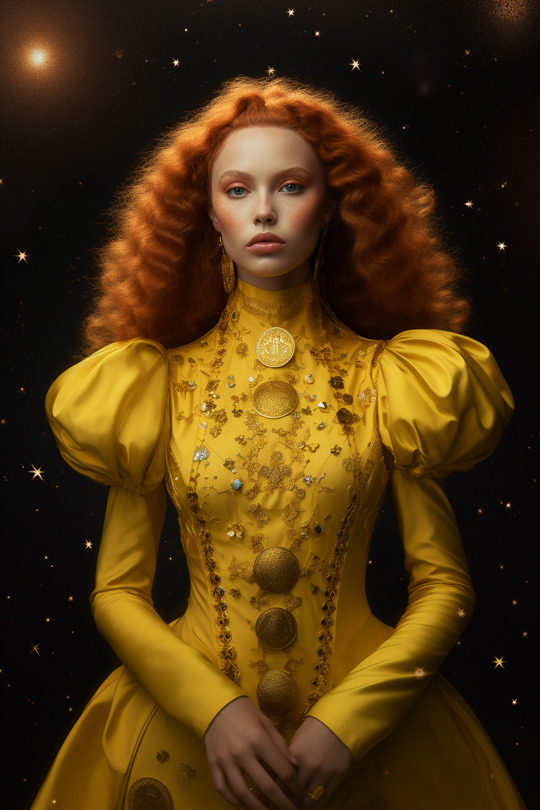

Flash, Dale, Aura and Barin in a Disney promotional campaign for “Adventures at Intergalactic High: Senior Year” (2015)

Jeffrey Hudson (with roommate Gregory Kant), (1955)


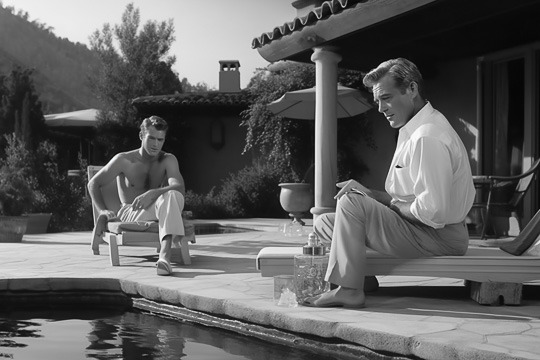
Jeffrey and Gregory’s famous bachelor pad. (1955)
FROM THE HOLLYWOOD REPORTER, 25 JULY, 1955
In this golden age of Hollywood, two dashing actors have caught the public's eye with their incredible talent and undeniable charm: Jeffrey Hudson and Gregory Kant. These two heartthrobs, best known for their roles as Flash Gordon the space hero and Buck Howard, (sheriff of Dustbowl in the TV series “Hardwood”), are two of the most eligible bachelors on the planet! Nevertheless, these two bachelors seem to enjoy spending time with each other just as much as they enjoy attending glamorous star-studded premiers with a beautiful starlet on their arm.
Their shared home, an elegant sanctuary hidden in the Hollywood Hills, is the epitome of style and sophistication. Decorated with tasteful, modern furnishings, the living room is a testament to their shared love for contemporary design. This warm, inviting space is where Jeffrey and Gregory spend countless hours discussing their craft, sharing stories, and enjoying each other's company and with close friends invited for a weekend getaway.
Will these best friends stay single forever or will they find that special someone to marry and call their own then finally give up their bachelor’s paradise?
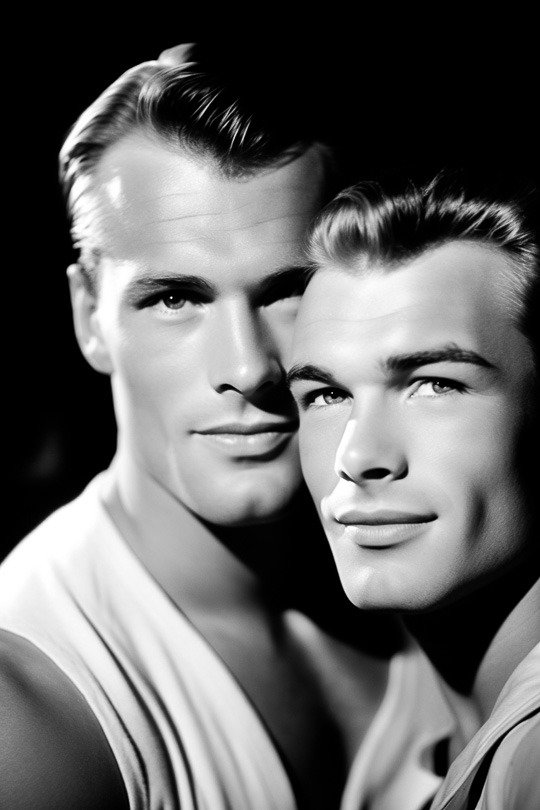
Jeffrey Hudson and Gregory Kant (1955)
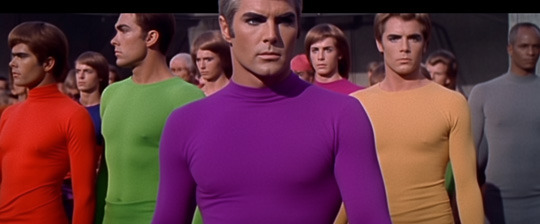

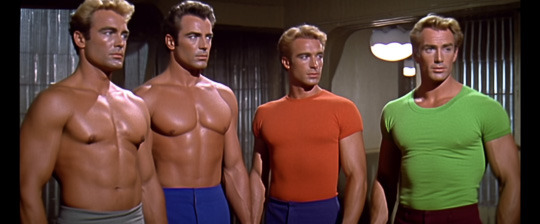
“Flash Gordon and the Happening on Planet Mongo” (1968)

Brian Morse as Prince Thun (1994)

Dorothy Thompson as Dale Arden in “Flash Gordon and the Invisible Phantom” (1951)

Dale Arden, Flash Gordon fashion photo spread for Vogue Magazine, (2021)

Kenneth Williams as Emperor Omipalone in “Flash Gordon and the Conquest of Planet Polari” (1966)
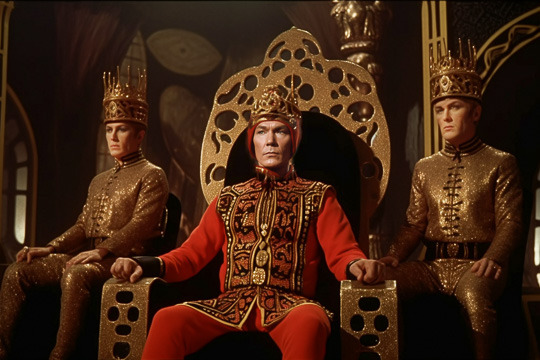
Emperor Omipalone and his henchmen, Julian and Sandy, “Flash Gordon and the Conquest of Planet Polari” (1966)

Williams controversially only spoke in Polari during the entire film leaving some audience members baffled and confused. Subtitles were suggested for some theatres, (especially those located outside of large metropolitan areas), but this proved difficult as Polari was fairly obscure even in the 1960s, (although it had come into more common consciousness through some radio broadcasts).
Finally, a small company called “Bona Lingo” was hired from a little shop in Soho, London, which was able to provide the translations. The following is a sample of Williams announcing his plans for universal domination:
“As Emperor Omipalone, the villainous nanti-bona emperor of the cosmos, I've nattered to me palones and omies about me bijou plan to troll over the universe, naffing it up as I go. Vardering me lacoddy, all zhooshed up, and me basket well-crammed, I cackle to them, "Varder at me, omies and palones, we'll dish the dirt on all the other planets, scarpering their bijou dreams and turning them into a meshigener mess. We'll screech our Polari lingo from the zhooshy stars to the naffest corners, leaving chaos in our wake. Let's charper the universe together and make it bow before our wickedly fantabulosa reign!"”

Kenneth Williams as Emperor Omipalone in “Flash Gordon and the Conquest of Planet Polari” (1966)

Flash Gordon costume design by Jennifer Sonders, (1989)
#the flash files#midjourney 5#gpt 4#flash gordon#the howard c. rushbourne archive#the friends of flash foundation#parody
81 notes
·
View notes
Text
Tag 9 people you want to get to know better. Or however many.
tagged by @lullabyes22-blog Thank you!
Three ships:
Interested in SevikaxSilco thanks to you XD married for financial reasons
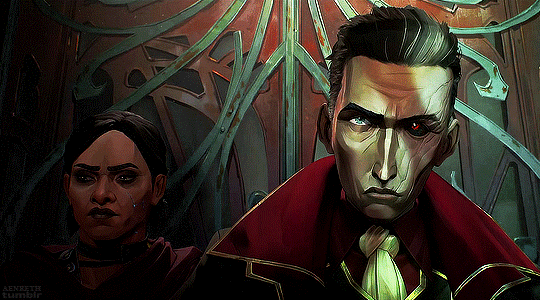
eruri in that special place of my dark heart

Jinx/Powder and Ekko is sweet and sad
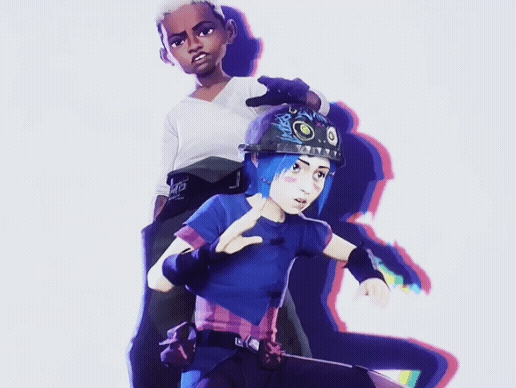
First ever ship: Probably Hao x Anna from Shaman King
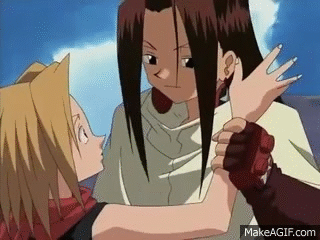
Last song: My Sweet Decadance by Psychonaut 4. Heed the warnings
Last Movie: The Hateful Eight. Wasn't blown away

Currently Reading: A WWII magazine focused on how fascism rised in Italy, Germany, Spain and Portugal
talk revolution to me by @letters-to-rosie
and eventually return to Forward but Never Forget / XOXO
Currently Watching: Vikings

Currently Consuming: Chocolate filled donut
Currently craving: will to do anything
tagging if you want to @letters-to-rosie @the-clueless-kitten @isindismay @alishatheninth @dorkwolf-marejai @thedarkivist @lestatdesade @thedarkivist @sonderous-opia
4 notes
·
View notes
Text
Doll de Fuyumi Sôryô
Fuyumi Sôryô commence sa carrière en 1982 dans le magazine shôjo Betsucomi avec Hidamari no hômonsha. En 1988, elle gagne le prix Shôgakukan dans la catégorie shôjo pour son manga Boyfriend (10 tomes, inédit). En 1996, elle signe un autre succès, Mars (publié chez nous par Panini). 2001 marque pour la mangaka un tournant: avec ES — Eternal Sabbath — (publié chez nous par Glénat), elle quitte le monde du shôjo pour celui du seinen. Son dernier succès, Cesare (publié chez nous par Ki-oon) s’est achevé en 2021.
Doll arrive dans la carrière de Fuyumi Sôryô juste avant Mars. Pré-publié dans le magazine shôjo Bessatsu Friend (Betsufure pour les intimes) à la fin de l’année 1995, le manga relate l’histoire de Mariel Blair, une débutante dans le monde du ballet new-yorkais. Par un concours de circonstances, la grande chorégraphe Ira Graham lui offre le rôle principal de son nouveau spectacle, Doll, aux côtés de Aleksei Romanov (dit Alyosha), star du milieu. Les deux découvriront l’un en l’autre un compatibilité à la ville comme à la scène.
Bien que le récit de Doll ne se concentre pas sur la danse, le manga s’inscrit dans la lignée des ballet manga, mangas ayant pour thématique la danse classique. Thématique récurrente des shôjo, on peut citer aux côtés de Doll, Hahakoi Waltz (Miyako Maki, 1957), Swan (Kyoko Ariyoshi, 1976) ou encore Do Da Dancin’! (Satoru Makimura, 2000).

Le manga se concentre sur le couple formé par Mariel et Aleksei ainsi que sur leurs vies intérieures. Au début du récit, Mariel est une jeune débutante dans le milieu du ballet, au caractère bien trempé. Son talent naturel pour la danse l’amène rapidement à fréquenter des professionnels aux carrières déjà longues. On découvre alors une Mariel emprise au doute et peu sûre d’elle. Elle ignore tout de son propre talent et le pense magnifié par la grande star qu’est Aleksei lorsqu’elle danse avec lui. Aleksei, de son côté, est un jeune ballerin déjà accompli qui recherche dans New York de nouvelles perspectives dans la danse. Malgré les entraves liées à son passé, il découvre auprès de Mariel un amour inconditionnel, infini qu’il confond, dans un premier temps, avec une dépendance affective étouffante de la part de Mariel. Finalement, il se révèle être celui qui a le plus besoin de sa partenaire. Tout le long du récit, Aleksei découvre ce que c’est que d’être aimé.

Dans ce court one-shot, Fuyumi Sôryô nous offre un beau condensé de ce qui fait tout son art. Son trait s’est affiné depuis ses débuts, il s’en dégage une délicatesse plutôt discrète. La composition de ses planches est riche d’idées ; son découpage est assez éclaté, comme le veut une certaine tradition shôjo, mais n’en reste pas moins linéaire et très clair. Le manga est aussi ponctué de moments forts en émotion résultant en des planches d'une grande beauté. Le tout faisant ressortir de Doll un certain équilibre et une sensibilité sur la réserve. À l’image même de la danse classique: ce qui est simple n’est pas forcément facile.
Avec Doll, Fuyumi Sôryô ne prend pas de risque. Elle prend pour contexte le monde du ballet, familier des lectrices de shôjo, et livre une histoire sans réelle grande originalité. Cependant, quand Fuyumi Sôryô fait quelque chose, elle le fait bien. Doll cristallise certainement ce qui fait toute la maestria de la mangaka. Elle gardera par la suite sa capacité à dévoiler et à sonder la psyché de ses personnages. Elle continuera aussi à aiguiser son trait tout en jouant de cet équilibre et de cette sensibilité qui fait d’elle une mangaka exceptionnelle.
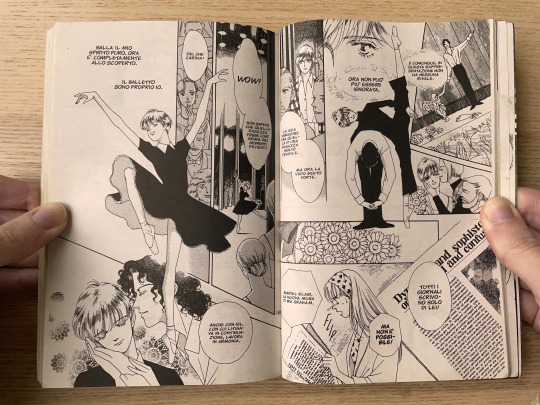
2 notes
·
View notes
Text
Magazine Highlights: Clarkesworld Jan 2024

highlighting my fave works from Clarkesworld issue 208, January 2024! a lot of bangers in this issue!
"Nothing of Value" - Aimee Ogden
premise: the narrator takes a futuristic transit system that scans them in one place and prints them out again in another to visit someone they haven't seen in many years, and made some promises to.
gut reaction: fantastic voice!! and i love stories addressed directly to another person! and the one-two gut punches at the end! also this bit got a laugh out of me: "I stand around, waiting, in case they’re on the verge of finishing up, but the baby is busy squashing cold fries in its fingers and the adults are busy thinking this is the cutest and best thing any living being has ever done. I bet that baby has never developed a microbe with a novel sulfur dioxide metabolic pathway."
"Down the Waterfall" - Cécile Cristofari
premise: a scientist explains her theory of time travel in moments of near-death, gets too high on her own supply, and dallies with a poet.
gut reaction: i don't generally get much out of this kind of quasi-infidelity, "this person is so much more compelling than my spouse and child" sort of story, but this one was beautifully written and had interesting time travel metaphors. i liked it enough to record it here so i will remember it later, though!
"Binomial Nomenclature and the Mother of Happiness" - Alexandra Munck
premise: a scientist with the technology to see sonder particles--created by emotions--begins to create a taxonomy and bonds with a talking elephant.
gut reaction: what a gem, holy moly. this one made my brain hurt in fun ways. i ADORE Angela the elephant. loved the slightly mixed up telling of this story, the academic and interpersonal drama, and really really loved the sonder particles concept and how that was described visually.
"Stars Don't Dream" - Chi Hui, transl. John Chu
premise: in a future where most humans spend all their time in a virtual world, five people gather in the real world with a plan for the continuation of life in our galaxy.
gut reaction: i love the rhythm and the beauty of the prose here. the specific start, and the enormous cyclical nature of the end. i love the delicate worldbuilding!
"You Dream of the Hive" - C.M. Fields
premise: a human is rescued from a collective consciousness in space and prepared for return to productive society.
gut reaction: wow, this story did a lot with a really elegant premise. it takes some twists and turns that i haven't seen before in combination, and lit up all my anti-capitalist neurons. i want the Hive to embrace me with ten thousand arms.
0 notes
Text


Albero di Limone available in Sonder Issue IV
#Sonder lit#Sonder#Albero di Limone#Sonder Magazine#Short story#prose#Sadbh Kellett#Irish writer#Irish writing#Italy#Positano#Summer#Tourism
0 notes
Text
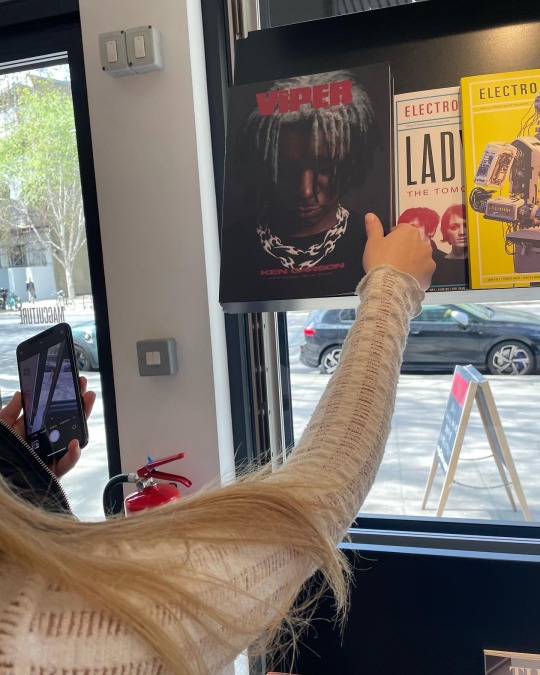







#magazine#ken carson#opium label#playboi carti#carti#destory lonely#teen x#xman#homixide gang#rapper#vipermagazine#music#music artists#fashion#opium#opiumaesthetic#sonder
70 notes
·
View notes
Text
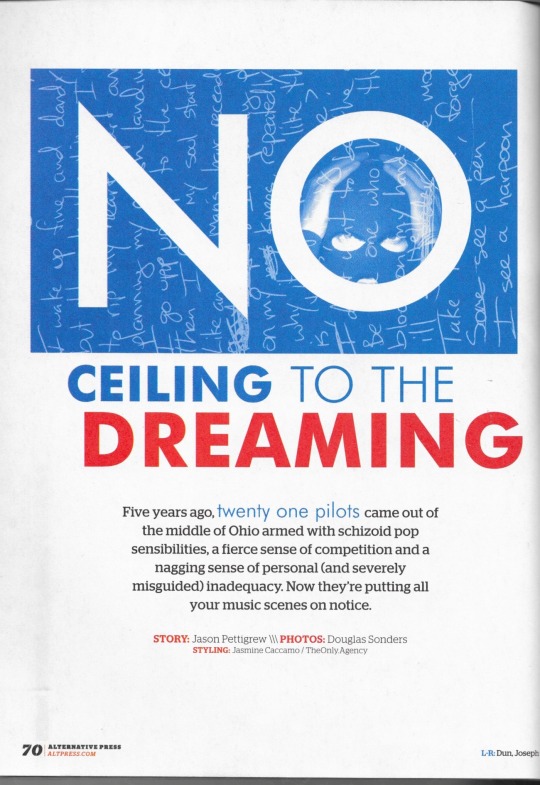


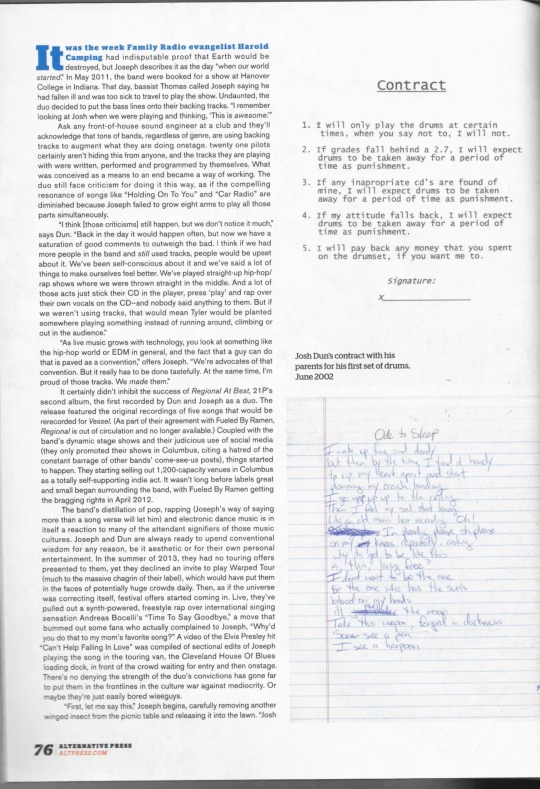
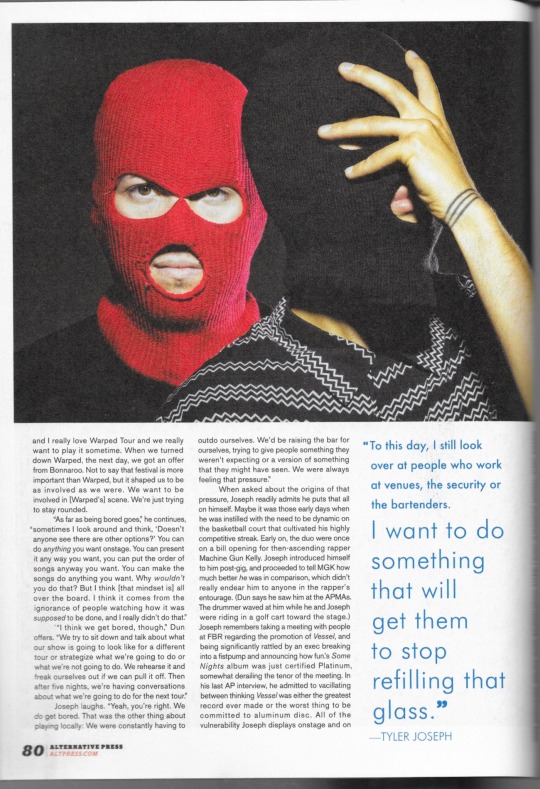


alt press november 2014 issue
#josh dun#joshua dun#twenty one pilots#twentyonepilots#tyler joseph#alt press#alternative press#november#jason pettigrew#douglas sonders#jasmine caccamo#theonly.agency#vessel#vessel era#ap magazine#ap mag#ap 316#316 issue#nov '14#2014#november 2014
70 notes
·
View notes
Text
60 Millions de consommateurs dévoile les secrets des repas en Ehpad
🍽️ Ehpad : La vérité sur les repas révélée ! 🚨 Découvrez ce que cachent vraiment les menus... #Ehpad #Alimentation #Enquête 🧓🍲🔍
Les établissements pour personnes âgées dépendantes (Ehpad) sont au cœur d’une controverse. La qualité nutritionnelle, vantée sur papier, est-elle vraiment au rendez-vous dans les assiettes ? Une récente enquête du magazine 60 Millions de consommateurs met en lumière des réalités troublantes.
L’Institut national de la consommation (INC) a collaboré avec le magazine pour sonder la qualité des…

View On WordPress
0 notes
Text
◀ 8 SEPTEMBRE ▶ 365 jours pour ranimer la flamme
Celui qui mange et boit sans discerner ce qu’est le Corps se condamne lui-même en mangeant et en buvant ainsi. C’est pour cette raison qu’il y a parmi vous tant de malades et d’infirmes, et qu’un certain nombre sont morts. 1 Corinthiens 11.29-30 (BDS)
Discerner le Corps de Christ.
Lorsque j’étais adolescent et qu’arrivait le moment de la Sainte-Cène dans mon église locale, le pasteur citait régulièrement ce passage biblique. Je consommais alors le pain et le vin tout en craignant d’être foudroyé sur place ou de me placer sous un joug de malédictions. En conséquence, j’essayais toujours de me sonder et de vérifier si je ne traînais pas quelques péchés « non déclarés » derrière moi avant de la prendre. Aujourd’hui, je me rends cependant compte que je n’avais pas saisi le sens véritable et la teneur complète de cet avertissement qui dit que certains tombent malades ou meurent car ils se condamnent eux-mêmes en prenant la cène « indignement ». Compte tenu des conséquences qui peuvent en découler, il est important que nous ayons tous pleinement connaissance de ce qu’implique la Communion, ce dernier repas pris par Jésus et que nous partageons dimanche après dimanche avec l’Église... (cf. 1 Corinthiens 11.23-29). La Sainte Cène est d’abord la communion avec Jésus, mais c’est AUSSI la communion dans l’union avec les membres de Son Corps, c’est-à-dire l’Église (cf. 1 Corinthiens 10.16-17). C’est pourquoi, au moment de ce partage dans un seul et même esprit, il est essentiel de se demander si nous sommes en règle avec chacun des membres du Corps de Christ, selon les commandements de Dieu. Et si toutefois nous sommes au cœur d’un conflit avec une sœur ou un frère chrétien, ou avec plusieurs, et que nous n’avons pas encore réglé ce problème (dispute, colère, critique, manque d’amour...), ne tardons pas à rétablir l’unité, à libérer notre cœur et celui de la personne. Si cela est possible, allons-nous réconcilier sans tarder, et optons pour le pardon. L’amour est en effet indispensable à la vie chrétienne, et c’est, avec la foi, un des « carburants » du Royaume de Dieu. En outre, le manque d’amour au sein de l’Église est un péché qui ouvre des portes à la maladie et peut même conduire jusqu’à la mort, tel que cela est mentionné en 1 Corinthiens 11. Marchons donc dans l’amour, édifions-nous et encourageons-nous les uns les autres, soyons des artisans de paix et préservons l’unité de l’Église afin de refléter la nature de Christ et être en action. Et soyons pour le monde le témoignage visible de Son amour, de Sa gloire et de Sa puissance qui transforme ! (cf. 1 Pierre 1.22 ; Jean 13:35). "365 jours pour ranimer la flamme" est un recueil de méditations bibliques écrites par David Houstin et Ezechiel 37 Ministères. À PROPOS DE NOUS "L'Observateur Chrétien" est un magazine et journal en ligne proposant des informations chrétiennes. Retrouvez quotidiennement une actualité ciblée ayant pour but d'encourager le chrétien, de démontrer que le retour de Jésus Christ est proche, mais également de fournir des sujets de prière. L'essentiel de l'info chrétienne, c'est ici que ça se passe ! SUIVEZ-NOUS Application Bible en ligne Newsletter A propos Proposer un article Faire un don Contact © 2017 - L'Observateur Chrétien - Lire plus ici :
0 notes
Text
Barbie (2023), de l'huile sur le feu

Poupée vaudou du modèle culturel américain, Barbie est célèbre, entre autres, pour avoir été la mascotte en plastique des 30 glorieuses. Indispensable fétiche fait d’hydrocarbures, elle entra comme un cheval de Troie des standards de beauté surréalistes dans la panoplie de millions de gamines. Si on le compare à ses voisins jouets, l'apparence de cet objet dénote très clairement avec les autres. Quand un jouet se veut sympathique, rigolo, coloré et original: la Barbie nous montrait tout l'inverse : un corps filiforme, froid et policé, étrangement réaliste parmi des bibelots absurdes; un corps d'adulte, mais qui pourtant ne se voyait nulle part. Le modèle d'un corps calibré et asexué dans son plus simple appareil dont l'unique intérêt était qu'il pouvait porter des vêtements.
Durant la première semaine d'exploitation des films, on voyait ça et là dans les rues des femmes habillées entièrement en rose. Le film suscitait un véritable engouement parmi les spectateurs, c'est donc dans une salle pleine que la rédaction du Rabiot Magazine a pu assister à sa séance. Et d'emblée, on peut considérer cela comme un point positif : il est rare pour un film de parvenir à faire sortir le public de son canapé sur lequel il est vissé depuis maintenant des années, à manger des chips devant des séries médiocres qu’il paye pourtant à prix d’or. Se rendre au cinéma en 2023, c'est souvent se retrouver dans une salle vide aux trois quarts, un peu comme lorsque l'on prend le dernier train du soir pour rentrer dans sa province désertique. Or, avec Barbie, la salle était comble et le public conquis d'avance : c'est donc non sans une certaine nostalgie teintée de naïveté que l'on se dit qu'on va passer un bon moment.
Produit par Warner Bros, avec un budget estimé à cent millions de dollars, le film Barbie se présente comme une comédie, interdite pourtant au moins de 13 ans. Et dès les premiers plans, on sent que la réalisation se cherche une certaine légitimité cinématographique: une reprise de 2001, L'odyssée de l'espace, comparant la poupée Barbie au monolithe dans un effort affichant la volonté de s'inscrire dans l'histoire de l'humanité et de son rapport à la poupée. Rien que ça. On rigole un peu à la rédaction, car c’est surtout dans l’histoire de l’idéologie qu’il faudrait lui trouver une place, à cet objet.
Les premières minutes du film en mettent littéralement plein la vue. Décor très travaillé et très coloré façon Squid Game, enchaînement de séquences frénétique et peu cohérent alterné de passages chorégraphies, nous voilà propulsés dans l'univers de la poupée Barbie, incarnée par l’actrice Margot Robbie. Un univers qui, dès le départ, semble habité par un conflit ouvert, une inégalité entre la femme et l’homme. Largement minoritaire et reléguée au rang d’accessoire, la figure masculine n'apparaît comme un pion dans le jeu d'une Barbie qui est le centre de toutes les attentions.
Le pitch est assez simple : le personnage de Barbie devient dysfonctionnel et doit se rendre dans la réalité pour régler son problème. Directement on pense à Soul de Pixar, à The Matrix encore à Toy Story. Le film se présente donc, comme une sorte de voyage initiatique au féminin, visant à sonder les profondeurs de son âme et à en explorer les zones d’ombre en passant entre les mondes. Sur le papier, on trouve quand même cela intéressant: utiliser une icône aussi clivante de la féminité pour provoquer une remise en question identitaire, interroger la figure féminine qui, par les évolutions sociétales est en pleine recomposition. On se dit alors que les spectateurs et spectatrices seront confrontés à des questionnements qu'ils n'attendaient peut-être pas en se rendant à cette séance de cinéma.
Mais très vite, tout dérape. Barbie, rejointe par Ken qui est incarné par le brillant Ryan Gosling, partent à l’aventure dans le monde des humains. Dans une réalisation qui rappelle celle des pranks sur YouTube, les deux personnages sont confrontés à une réalité, celle de la Californie. De surprises en désillusion, on nous montre très vite un monde qui serait intégralement régi par les hommes. Le patriarcat, puisqu'il est nommé ainsi dans le récit, est ici exposé de manière didactique et claire. Musculation, cols blancs et police montée jusqu’aux visages des pères fondateurs des USA sur les billets de banque, on nous dépeint une caricature de la société qui veut déclencher un ressort comique en nous montrant un Ken en extase devant ce monde clairement opposé au sien. Mais cela sonne déjà faux, même si c’est un peu drôle. Tout spectateur qui aura un minimum d’auto-dérision sera amusé par ce montage soviétique habilement exécuté par le monteur du film et le talent d’un Ryan Gosling que l’on ne reconnait pas tant il n’avait jamais souri dans Drive.
En réalité, le patriarcat en tant qu’idée est directement incarné par le groupe de dirigeants de la société Mattel, qui occupent une place importante dans ce récit de fiction. Un peu comme Néo qui retourne à la ferme des machines dans Matrix: Revolutions, le récit va amener Barbie dans le bureau du PDG de sa propre compagnie. On aurait aimé y voir Le parrain ou le Docteur Folamour, mais en réalité ni Disney, ni Marvel n’avaient osé se mettre en scène dans leurs propres fictions et cela de manière si importante pour le récit. Après la leçon, le cas pratique : une réunion d’hommes en costume, tous ridiculement soumis à un PDG tyrannique et farfelu, vient parfaitement illustrer cette vision diluée et manichéenne d’un monde exclusivement gouverné par les hommes.
Et là, on peut dire que le film réussit un petit peu son coup: cette simplification parfois grossière nous permet en réalité de mieux comprendre les injustices ressenties par le genre féminin que Barbie prétend représenter. Tout comme un certain entre soi exclusivement féminin, attristait le personnage de Ken au début du film, cette inversion d’un monde à l’autre nous permet de comprendre les défauts d'une hiérarchie sociale qui aurait le genre comme principal indicateur.
Puis le film continue sa descente aux enfers : qu'elle est retourné dans le monde, imaginaire, avant Barbie, important avec lui, des livres théoriques sur le patriarcat. On pouffe, quand on voit que le seul rôle donné à l’objet livre dans ce film est celui de vecteur d'un dogme et de contenant idéologique. Barbie, revenant dans son monde accompagné d’humaines, découvre avec stupeur que Ken, jetant le patriarcat dans son monde comme un mauvais sort, a pris le pouvoir. Mais pas le pouvoir politique, celui d’être désormais le centre de l’attention du monde imaginaire de Barbie. Et là encore, le film nous montre une caricature du patriarcat encore plus difforme et absurde: les « femmes » de Barbie-land sont serveuses, idiotes et heureuses de l’être; et le monde de Ken ressemble à une fraternité étudiante de mauvais film hollywoodien.
On remarque que si toutes ces étapes permettent à Barbie d’évoluer sur sa condition et sa situation, l’homme est toujours aussi idiot et stupide. Sa prise de pouvoir ne lui a rien apporté et il parait plus simplet que jamais et les femmes, elles, sont les victimes d’un jeu idiot.
L’enjeu principal du film se précise: il y aurait une guerre de pouvoir entre les hommes et les femmes, dans lequel l’homme (et avec lui le patriarcat) serait « le méchant » à anéantir pour espérer une fin heureuse.
Et on se demande soudain à quel endroit le film a bien pu glisser: de divertissement édulcoré à brûlot idéologique, de fan-service à manuel de guérilla, de comédie décalée à manifeste politique. Ça sent pas bon. Regardons au-delà du film: un monde polarisé à l’extrême, qui oppose la femme l’homme en les présentant comme deux communautés distinctes ayant leurs propres codes et valeurs, une société organisée autour d’un conflit, structurée par des barrières entre les gens.
Une vision du monde que le Rabiot attribuera tout particulièrement à la population nord-américaine, dont l’histoire a prouvé que cette société s’est construite sur la division, la ségrégation et le communautarisme. Une vision du monde par la jeune société d’un pays si peu uni qu’il ne porte pas de nom, qui elle aussi se recompose et évolue par les réseaux.
Depuis l’après-guerre, le cinéma américain avait inondé les écrans de son modèle de société et de relations matrimoniales stéréotypées de romantisme. Voilà maintenant qu’on nous sert une pseudo-lutte des classes déguisée en guerre des sexes, prédigérée pour un public en déficit d’attention.
Réussissant à jouer des stéréotypes en créant une confusion dans l’esprit du public, on ne sait plus qui est « le méchant du film » : est-ce Ken, le patriarcat, tous les hommes en général ? Pour résoudre la situation et sortir d’une catatonie éternelle, Barbie et ses complices doivent donc organiser un putsch politique. Pour procéder, elles devront exploiter les faiblesses de l’homme (jalousie, orgueil) pour créer un conflit entre eux afin de créer une diversion, qui leur permettra de reprendre le pouvoir. On nage en plein délire idéologique et on assiste à de véritables tutoriels pour semer la discorde entre les gens, ainsi qu’à la satisfaction des personnages devant leurs desseins accomplis. Inutile de préciser que l’homme-puisqu’il est ainsi caricaturé- est un benêt qui tombe dans tous les pièges qu’on lui tend, naïf avec un QI d’huitre. Heureusement que Ryan Gosling a du talent, sans quoi le malaise aurait été absolu.
Puis vient le clou du spectacle, l’épilogue, dans lequel tous les personnages du films se retrouvent comme pour assister ensemble au happy ending. Comme annoncé, le pouvoir a été rétabli et Ken, désormais sortant, doit quitter Barbie dans un simulacre de rupture amoureuse. On était prêt à tout, mais pas à ça. Dernière balle perdue pour l’homme qui est maintenant présenté, de son propre aveu, comme n’existant que par et pour les yeux de sa partenaire, si dépendant d’elle qu’une séparation bouleverserait sa personnalité. En revanche, la femme est présentée plus heureuse et plus libre lorsqu’elle est seule: Ken est donc un boulet et Barbie, forte et indépendante, congédie Ken à son propre destin comme un malinois dangereux sur une aire d’autoroute.
Au générique, on a quand même un sentiment d’amertume. L’énergie du récit, son moteur principal, c’est un conflit entre hommes et femmes. La femme, sensible et profonde, y est inégale à l’homme, brutal et grossier. Cette logique trompeuse permet de justifier les curieuses valeurs politiques véhiculées par le film en posant une question piège: pourquoi devrait-il y avoir égalité entre des êtres par essence inégaux ? On réfléchit, puis on se souvient de l’histoire du pays de production du film, à laquelle la rédaction a fait allusion un peu plus haut.
Tout le film capitalise sur une guerre des sexes puérile, un conflit de cour de récréation entre filles et garçons qui serait devenu une généralité universelle. Les personnages nous embarquent donc avec eux dans leur lutte pour l’égalité qui est en réalité profondément manichéenne donc inégale par essence. La victoire s’obtient par la suprématie de l’un sur l’autre: c’est donc d’un monde totalitaire et d’une violence extrême dont on nous fait la promotion. À la fin, le film ne règle rien et n’apporte aucune solution à ce qu’il présente comme un problème. Au contraire, il met de l’huile sur le feu. Aurait-on mal compris le sens de l’existence de la poupée Barbie qui en réalité serait une militante révolutionnaire, une sorte de Che Guevara ? Mattel aurait donc « oublié » de donner cette information dans le marketing de ses produits ?
Avec des apparences de progressisme et d’égalitarisme, le film est en réalité profondément conservateur. La Belle au bois Dormant rêve qu’elle est Staline. On se demande comment les gamines -dont on sait déjà que ce film sera leur baby-sitter et éducateur par l’intermédiaire de parents démissionnaires- vont assimiler ces stéréotypes édulcorés et colorés comme des céréales cancérigènes. L’abondance de références cinématographiques sauve l’honneur de la Warner sans pour autant faire celui de la réalisation. Visuellement écoeurant, moralement déséquilibré, écriture au forceps et idées hétérogènes jetées pêle-mêle dans un grand bol en acrylique rose fuchsia, le film a la consistance d’une pâte à gâteau ratée, pleine de grumeaux et d’ingrédients absurdes, dont la cuisson aura donné un truc difforme et -agrémenté à la dégustation de quelques larmes de réactionnaires- vaguement comestible sur le moment mais qui garantit l’indigestion.
NDLR: La Rédaction du Rabiot a vu ce film lors de sa première semaine d’exploitation. Alors que cette critique était en pleine gestation, on a remarqué que le film a fait couler beaucoup d’encre, les médias d’un certain bord politique tous vent debout contre ce produit culturel en réalité de leur côté. On voit, ça et là, des autrices d’articles dépêchées pour faire dire les pires choses, pantins à leur tour d’une idéologie conditionnant leur rémunération. Rejoignez la Rédaction !
#barbie movie 2023#the barbie movie#barbie#text post#barbie 2023#barbie movie#critique#cinéma#media critique#critique ciné
0 notes